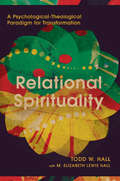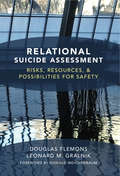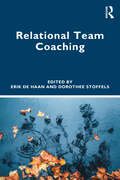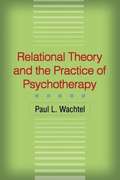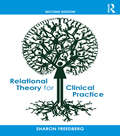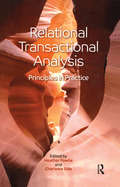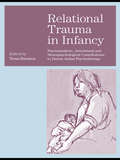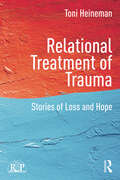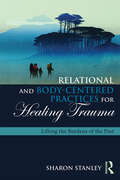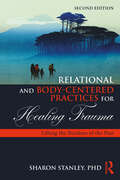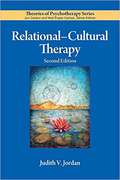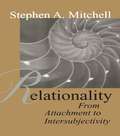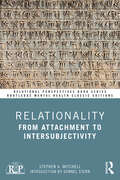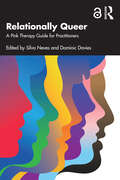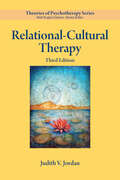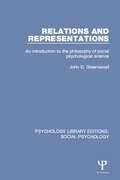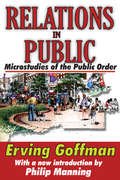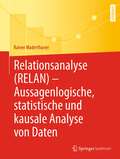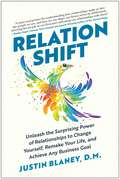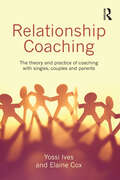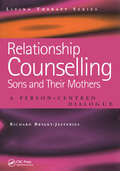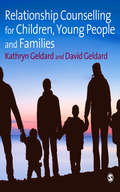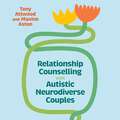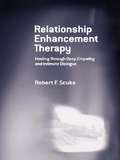- Table View
- List View
Relational Spirituality: A Psychological-Theological Paradigm for Transformation (Christian Association for Psychological Studies Books)
by Todd W. HallAs our society becomes more socially fragmented, many Christians feel disconnected and struggle to grow spiritually. Common models of spiritual transformation are proving inadequate to address "the sanctification gap." In recent decades, however, a new paradigm of human and spiritual development has been emerging from multiple fields. It's supported by a critical mass of evidence, all pointing to what psychologists Todd W. Hall and M. Elizabeth Lewis Hall call a relational revolution. In Relational Spirituality, Hall and Hall present a definitive model of spiritual transformation based on a relational paradigm. At its heart is the truth that human beings are fundamentally relational—we develop, heal, and grow through relationships. While many sanctification models are fragmented, individualistic, and lack a clear process for change, the relational paradigm paints a coherent picture of both process and goal, supported by both ancient wisdom and cutting-edge research. Integrating insights from psychology and theology, this book lays out the basis for relational spiritual transformation and how it works practically in the context of relationships and community. Relational Spirituality draws together themes such as trinitarian theology, historical and biblical perspectives on the imago Dei, relational knowledge, attachment patterns, and interpersonal neurobiology into a broad synthesis that will stimulate further dialogue across a variety of fields. Highlighting key characteristics of spiritual communities that foster transformation, Hall and Hall equip spiritual leaders and practitioners to more effectively facilitate spiritual growth for themselves and those they serve.
Relational Suicide Assessment: Risks, Resources, And Possibilities For Safety
by Leonard M. Gralnik Douglas FlemonsA relational approach to evaluating your suicidal clients. Given the isolating nature of suicidal ideation and actions, it's all too easy for clinicians conducting a suicide assessment to find themselves developing tunnel vision, becoming overly focused on the client's individual risk factors. Although critically important to explore, these risks and the danger they pose can't be fully appreciated without considering them in relation to the person's resources for safely negotiating a pathway through his or her desperation. And, in turn, these intrapersonal risks and resources must be understood in context--in relation to the interpersonal risks and resources contributed by the client's significant others. In this book, Drs. Douglas Flemons and Leonard M. Gralnik, a family therapist and a psychiatrist, team up to provide a comprehensive relational approach to suicide assessment. The authors offer a Risk and Resource Interview Guide as a means of organizing assessment conversations with suicidal clients. Drawing on an extensive research literature, as well as their combined 50+ years of clinical experience, the authors distill relevant topics of inquiry arrayed within four domains of suicidal experience: disruptions and demands, suffering, troubling behaviors, and desperation. Knowing what questions to ask a suicidal client is essential, but it is just as important to know how to ask questions and how to join through empathic statements. Beyond this, clinicians need to know how to make safety decisions, how to construct safety plans, and what to include in case note documentation. In the final chapter, an annotated transcript serves to tie together the ideas and methods offered throughout the book. Relational Suicide Assessment provides the theoretical grounding, empirical data, and practical tools necessary for clinicians to feel prepared and confident when engaging in this most anxiety-provoking of clinical responsibilities.
Relational Team Coaching
by Erik De Haan Dorothee StoffelsRelational Team Coaching is a state-of-the-art reference book detailing what makes team coaching effective, with a focus on being able to work at a relational level within the here and now, about what is going on in the present in the team and between the team and the coach. The scope of the book is comprehensive, exploring challenging and topical issues. Part A presents an introduction to team coaching and to a relational, integrative approach to team coaching, providing access to all relevant background, research and case studies of team coaching in action. Part B deepens how this relational philosophy looks in practice and what it means for choices and working methodology of the team coach. Part C, finally, explores how the team coach can step up to face or address the more challenging or professional aspects of practice (e.g., of contracting, diversity and inclusion, and the shadow side of boards). This book is an essential guide to relational-based effectiveness in team coaching. It will be a key text for all coaching practitioners, including those in training.
Relational Theory and the Practice of Psychotherapy
by Nancy Mcwilliams Paul WachtelThis important and innovative book explores a new direction in psychoanalytic thought that can expand and deepen clinical practice. Relational psychoanalysis diverges in key ways from the assumptions and practices that have traditionally characterized psychoanalysis. At the same time, it preserves, and even extends, the profound understanding of human experience and psychological conflict that has always been the strength of the psychoanalytic approach. Through probing theoretical analysis and illuminating examples, the book offers new and powerful ways to revitalize clinical practice.
Relational Theory and the Practice of Psychotherapy
by Paul L. WachtelThis important and innovative book explores a new direction in psychoanalytic thought that can expand and deepen clinical practice. Relational psychoanalysis diverges in key ways from the assumptions and practices that have traditionally characterized psychoanalysis. At the same time, it preserves, and even extends, the profound understanding of human experience and psychological conflict that has always been the strength of the psychoanalytic approach. Through probing theoretical analysis and illuminating examples, the book offers new and powerful ways to revitalize clinical practice. See also Wachtel's Therapeutic Communication, Second Edition: Knowing What to Say When, an integrative, practical guide for therapists of all orientations.
Relational Theory for Clinical Practice
by Sharon FreedbergRelational Theory for Clinical Practice offers students and practitioners a conceptual framework for thinking relationally about social work with clients within a biological, psychological, and socio-cultural framework.? Integrating relational theory with the principles of clinical practice, and demonstrating how this can be applied to social work practice, this book has been revised and updated to be suitable for students.? Using plenty of? case material to demonstrate the theory in action, the new edition incorporates teaching points to aid readers in drawing out the practice principles developed in each chapter. Keeping relationships at the center of the text, this edition includes substantially expanded chapters on assessment and intervention, and takes into account recent research on issues such as the impact of trauma and stress; neuroscience and brain research; and the necessity of practicing in a culturally sensitive way with diverse populations.? It broadens the feminist focus of relational-cultural theory by extending and applying it to men also. Designed for use on master's level courses in practice, as well as courses on human behavior and the social environment, this concise and practical book is a valuable text for social work and counseling students.?
Relational Transactional Analysis: Principles in Practice (Advancing Theory In Therapy Ser.)
by Charlotte Sills Heather Fowlie'Through different voices and styles of contributions, including papers, edited talks and panel discussion, this collection explores and applies the principles of relational transactional analysis. It sets them in social, cultural and political contexts, and considers a number of important implications of this particular relational turn in psychotherapy. The book advances relational transactional analyses and, in doing so, reflects the creativity and vibrancy of contemporary TA. The editors have skilfully brought together different generations of TA practitioners in an accessible and stimulating volume. I commend the editors and highly recommend the book.'- Dr Keith Tudor, author of a number of books and co-author of the article "Co-creative transactional analysis" in the Transactional Analysis Journal. He is Associate Professor, Auckland University of Technology, Auckland, Aotearoa, New Zealand.
Relational Trauma in Infancy: Psychoanalytic, Attachment and Neuropsychological Contributions to Parent-Infant Psychotherapy
by Tessa BaradonThis book presents an interdisciplinary discussion between researchers and clinicians about trauma in the relationship between infants and their parents. It makes an innovative contribution to the field of infant mental health in bringing together previously separated paradigms of relational trauma from psychoanalysis, attachment and the neurosciences. With contributions from a range of experts, areas of discussion include: intergenerational transmission of relational trauma and earliest intervention the nature of the traumatising encounter between parent and infant the therapeutic possibilities of parent-infant psychotherapy in changing the trajectory of transmitted trauma training and supporting professionals working with traumatised parents and infants. Relational Trauma in Infancy will be of particular interest to trainee and qualified child and adult psychotherapists, clinical psychologists, child and adult psychiatrists, psychoanalysts, health care professionals and social workers.
Relational Treatment of Trauma: Stories of loss and hope (Relational Perspectives Book Series)
by Toni HeinemanRelational Treatment of Trauma: Stories of loss and hope is the culmination of over 35 years of psychotherapy with children and adults, many of whom have suffered the effects of physical, emotional, or sexual abuse. It addresses a gap in the literature on the treatment of trauma and chronic loss that are ubiquitous parts of life in foster care. While "trauma-informed care" has received considerable attention recently, there is little that focuses on the consequences of repeated, unexpected, and unexplained or unexplainable losses of caregivers. Relational Treatment of Trauma explores the ways in which those experiences arise in the therapeutic relationship and shows how to help clients build the trust necessary for establishing healthier, and more satisfying and hopeful relationships. Toni Heineman introduces and reinforces the concept of the relationship as the most powerful agent of therapeutic change. She highlights the ways in which clinicians can build and sustain a relationship with clients whose experience of trauma can make them wary of trusting, illustrating this theme throughout the book with compelling case vignettes. The book is especially valuable for psychoanalysts, clinical psychologists, psychiatrists, social workers, and family therapists working with those who have suffered traumatic loss. It is essential reading for clinicians in the early part of their career, working with traumatized individuals for the first time. Dr. Heineman has practiced in San Francisco for over 35 years, working with children, adults, and families. She is the founder and executive director of A Home Within. Dr. Heineman presents and publishes widely.
Relational and Body-Centered Practices for Healing Trauma: Lifting the Burdens of the Past
by Sharon StanleyRelational and Body-Centered Practices for Healing Trauma provides psychotherapists and other helping professionals with a new body-based clinical model for the treatment of trauma. This model synthesizes emerging neurobiological and attachment research with somatic, embodied healing practices. Tested with hundreds of practitioners in courses for more than a decade, the principles and practices presented here empower helping professionals to effectively treat people with trauma while experiencing a sense of mutuality and personal growth themselves.
Relational and Body-Centered Practices for Healing Trauma: Lifting the Burdens of the Past
by Sharon StanleyThe second edition of Relational and Body-Centered Practices for Healing Trauma expands on this groundbreaking model for the treatment of trauma. It includes new principles and healing practices to address individual and collective trauma from climate instability, colonization, the global pandemic, and political unrest. Dr. Stanley expands on body-based relational practices, including subjectivity, embodied intersubjectivity, reflective empathy, and community practices, to embody ancient ways of knowing. She helps individuals and communities respond to adversity with vitality, empathy, and love.Dr. Stanley combines research in neuroscience and phenomenology, extensive clinical therapeutic experience, knowledge gained from training thousands of students, and collaboration with Indigenous people and traditional societies around the globe. With cross-cultural wisdom, she delves into aspects of somatic therapy and cultural healing, including: Key elements of relational empathy, such as bracketing biases while allowing one’s presence to connect with others, the self, and spiritual understanding The role of homeostasis in healing, which vitalizes recovery from psychological, social, cognitive, and spiritual dimensions of trauma How collective trauma can be effectively healed through relational community support This new edition helps readers deepen and expand their understanding and practice of somatic healing to transform their practice, as well as their connection with others and themselves.
Relational-Cultural Therapy
by Judith V. JordanIn this second edition of Relational–Cultural Therapy (RCT), Judith V. Jordan returns to explore the history, theory, and practice of relationship centered, culturally oriented psychotherapy. <p><p> Western psychological theories generally depict human development as moving from dependence to independence. In contrast, RCT is built on the premise that, throughout the lifespan, human beings grow through and toward connection, and that we need connections to flourish. This theory views isolation, at both individual and cultural levels, as a major source of suffering. The goal of the relational therapist is to deepen the therapeutic relationship and, ultimately, the client’s relationships outside of therapy. The client’s relational images—positive or negative expectations created by past relationships – influence current relationships, and a negative image can result in disconnections between people and society. This essential primer, amply illustrated with case examples, is perfect for graduate students and seasoned practitioners alike. This new edition highlights new research on the effectiveness of RCT in a variety of real-world situations—such as developing team-building exercises in workplaces, and providing a theoretical frame for an E.U.-sponsored conference on human trafficking.
Relationality: From Attachment to Intersubjectivity (Relational Perspectives Book Series #Vol. 20)
by Stephen A. MitchellIn his final contribution to the psychoanalytic literature published two months before his untimely death on December 21, 2000, the late Stephen A. Mitchell provided a brilliant synthesis of the interrelated ideas that hover around, and describe aspects of, the relational matrix of human experience. Relationality charts the emergence of the relational perspective in psychoanalysis by reviewing the contributions of Loewald, Fairbairn, Bowlby, and Sullivan, whose voices converge in apprehending the fundamental relationality of mind. Mitchell draws on the multiple dimensions of attachment, intersubjectivity, and systems theory in espousing a clinical approach equally notable for its responsiveness and responsible restraint. Relationality "signals a new height in Mitchell's always illuminating writing" (Nancy Chodorow) and marks the "coming of age" of the relational perspective in psychoanalysis (Peter Fonagy).
Relationality: From Attachment to Intersubjectivity (Relational Perspectives Book Series)
by Stephen A. MitchellThis book, first published in the year of the author’s death, expresses Mitchell’s vision for the theory of relational psychoanalysis, and provides his most-developed expression of its foundations. Now republished in this Classic Edition, Mitchell’s ideas are brought back to the psychoanalytic readership, complete with a new introduction by Donnel Stern. In his final contribution to the psychoanalytic literature, the late Stephen A. Mitchell provided a brilliant synthesis of the interrelated ideas that describe the relational matrix of human experience. Relationality charts the emergence of the relational perspective in psychoanalysis by reviewing the contributions of Loewald, Fairbairn, Bowlby, and Sullivan, whose voices converge in apprehending the fundamental relationality of the human mind. Mitchell draws on the multiple dimensions of attachment, intersubjectivity, and systems theory in espousing a clinical approach equally notable for its responsiveness and responsible restraint. This remains a canonical text for all relational psychoanalysts and psychotherapists.
Relationally Queer: A Pink Therapy Guide for Practitioners
by Dominic Davies Silva NevesRelationally Queer explores diverse intimate relationship styles and the connections with self for clinicians interested in gender, sex and relationship diversity. Offering readers a more inclusive and queer-friendly way of thinking about relationships, the book covers a range of topics that include intersectionality, consensual non-monogamy, working with shame, intimate partner violence, religious identities, and living with HIV. Exploring beyond a Eurocentric perspective, the book features a chapter on African-centred therapy and also includes the relationships of often erased populations such as bisexual people, sex workers, people with chronic health issues and trans people. The book will help psychosexual and relationship therapists, counsellors and psychologists who work with clients of diverse genders, sexualities and relationships.
Relational–Cultural Therapy: A Relational-cultural Approach With Couples (Theories of Psychotherapy Series®)
by Judith V. Jordan PhDIn this third edition, Judith Jordan explores the history, theory, and practice of relationship-centered, culturally oriented psychotherapy as a tool for building meaningful connections in a world of increasing isolation. This essential primer is ideal for students and practitioners alike, guiding them through the ins and outs of relational–cultural therapy (RCT). New to this edition is real-world research and guidelines related to distance learning, working with marginalized groups, and working towards social justice. Jordan built RCT upon the understanding that people need social and emotional connections to flourish. In a digital era full of uncertainty and disconnection, it is more important than ever to mend relational resilience and reestablish positive, growth-fostering relationships. The therapist therefore works to deepen their bond with the client to help them build similar bonds outside of therapy. They work with the client&’s relational images based on positive and negative experiences to manage expectations and teach relationship-building skills.
Relations and Representations: An introduction to the philosophy of social psychological science (Psychology Library Editions: Social Psychology #12)
by John D. GreenwoodWhat is the nature of social psychological science? What does a realist approach to human behaviour offer? Originally published in 1991, this lucid introduction to the philosophy of social psychological science takes a new and original approach to the subject. The author repudiates traditional empiricist and hermeneutical accounts, advancing instead a realist philosophy of social psychological science that maintains objectivity while at the same time stressing the social dimensions of mind and action. The author provides novel perspectives on the problems and potential of those sciences concerned with human behaviours that are constituted as meaningful actions by their social relational, and representational dimensions. He focuses in particular on the social identity of human actions and psychological states, on the objectivity of theoretical description and causal explanation, and on the role of experimentation. This approach, aimed at reconciling our scientific interest with our human intuitions, results in a richer conception of social psychological theory and phenomena than was found in most contemporary theoretical accounts. A stimulating and thought-provoking text, this title will still be of special value to students and teachers of psychology, sociology, anthropology and philosophy.
Relations in Public: Microstudies of the Public Order (Pelican Ser.)
by Erving GoffmanUntil recently, to be in a public place meant to feel safe. That has changed, especially in cities. Urban dwellers sense the need to quickly react to gestural cues from persons in their immediate presence in order to establish their relationship to each other. Through this communication they hope to detect potential danger before it is too late for self-defense or flight. The ability to read accurately the informing signs by which strangers indicate their relationship to one another in public or semi-public places without speaking, has become as important as understanding the official written and spoken language of the country.In Relations in Public, Erving Goff man provides a grammar of the unspoken language used in public places. He shows that the way strangers relate in public is part of a design by which friends and acquaintances manage their relationship in the presence of bystanders. He argues that, taken together, this forms part of a new domain of inquiry into the rules for co-mingling, or public order.Most people give little thought to how elaborate and complex our everyday behavior in public actually is. For example, we adhere to the rules of pedestrian traffic on a busy thoroughfare, accept the usual ways of acting in a crowded elevator or subway car, grasp the delicate nuances of conversational behavior, and respond to the rich vocabulary of body gestures. We behave differently at weddings, at meals, in crowds, in couples, and when alone. Such everyday behavior, though generally below the level of awareness, embodies unspoken codes of social understandings necessary for the orderly conduct of society.
Relationsanalyse (RELAN) - Aussagenlogische, statistische und kausale Analyse von Daten
by Rainer MaderthanerDieses Lehrbuch führt in die Relationsanalyse, eine neue Methode der statistischen Auswertung ein. Das vorliegende Konzept richtet sich keineswegs nur an FachstatistikerInnen, sondern soll für möglichst viele EmpirikerInnen mit etwas statistischem Interesse konkrete Nutzungsanregungen bieten. Diese ist eine logisch-statistische Methode zur Analyse, Exploration und Prüfung von multivariaten, multifunktionalen und kausalen Hypothesen aus verschiedenen Fachgebieten. Zunächst wird die Methode in ihren Grundzügen erklärt und anschließend wird auf die Vorteile dieser Methodik im Vergleich zu bereits bestehenden statistischen Methoden eingegangen. Das dafür spezifisch entwickelte und online verfügbare Computerprogramm RELAN wird detailliert, praxisnah und anhand von Beispielen erklärt. Das Buch eignet sich für LeserInnen verschiedener Interessenslagen und enthält daher eine Leseanleitung, je nachdem, ob man mehr an der Theorie oder der praktischen Nutzung der Methode interessiert ist. Als Anwendungsgebiete kommen Psychologie, Soziologie, Biologie, Medizin, Pharmakologie, Ökonomie, Ökologie, Meteorologie, Astrophysik, … in Frage, in welchen die erforschten Gesetze multikausal, bedingt-kausal, indirekt-kausal und multieffektiv beschrieben werden können.
Relationshift: Unleash the Surprising Power of Relationships to Change Yourself, Remake Your Life, and Achieve Any Business Goal
by Justin BlaneyLearn to leverage your relationships so you can dream bigger, achieve whatever you want, and build a life that makes you happier with each passing day. No greater force for change exists than the people we surround ourselves with. Relationshift explores how the people in your life have colored your worldview, how this limits or expands your options, and what to do about it. Through the stories of British explorer Gertrude Bell, abolitionist hero Frederick Douglass, music icons the Beastie Boys, and many others, this book will help you: Learn how to connect with high-caliber people who can help you go further in life. Understand the rules of life as handed down through countless generations—then learn how to recognize which ones can be bent. Grow in happiness, thankfulness, peace, and contentment while eliminating the power of negative emotions. Explore how our minds reject new concepts like our bodies reject viruses. Build a personal tribe that can help you achieve any goal in work, health, or relationships. Make better choices by learning to see your options more clearly and honing your ability to move quickly with less information. Identify relationships that have the most impact on your wellbeing, for better or worse. Discover and refine the direction of your life by exploring wisdom from twenty experts on purpose. With dozens of illustrations and practical examples, Relationshift will help you take greater control of your life and uncover a path to your best possible future.
Relationship Coaching: The theory and practice of coaching with singles, couples and parents
by Elaine Cox Yossi IvesRelationship Coaching provides a comprehensive guide to coaching to achieve relationship success and enrichment in three main areas: to help single people to form and secure stable relationships, to assist couples seeking to enhance their relationship and to support parents looking to improve their relationships with their children. Yossi Ives is an experienced relationship coach and Elaine Cox is an expert on developmental coaching approaches. They explain how the fundamental elements of coaching are customised and adapted to meet the needs of relationship enhancement. The book introduces specific coaching theories, processes and techniques through the use of practical case studies, which provide insight into a range of applications and contexts, and introduces new ways of approaching marriage and singles coaching. Relationship Coaching combines an accessible, practical guide with a strong theoretical underpinning. It will be an essential guide for coaches, counsellors and students, as well as other professional helpers including social workers and ministers.
Relationship Counselling - Sons and Their Mothers: A Person-Centred Dialogue (Living Therapies Series)
by Richard Bryant-JefferiesYoung men trying to resolve traumatic experiences and relationship issues with their mothers is not an area that has attracted a great deal of attention, and yet it is not uncommon. Peter is 28, still living at home and feeling ‘like I just don’t have a life I can call my own.’ As he tries to remedy this, the reaction he gets is ""So, where have you been?"; "What time do you call this?"; "I’ve been worrying about you" ;"You said you’d be back before now." Any pleasure from his evening melts away and he wonders why on earth is he still in the same house as her. This book uses fictitious dialogue to enable readers to experience the struggle of a young man trying to break free from the damaging and dominating influence of his mother. It contains both counselling sessions and supervision sessions, inviting the reader to step into the therapeutic process and experience Peter (the client) as he struggles to create a life for himself, Michael (his counsellor) seeking to offer and maintain the therapeutic conditions of congruence, empathy and unconditional positive regard, and Suzy (Michael’s supervisor). Practical advice, reflections on the counselling process, helpful summaries and points for discussion are highlighted throughout. Counsellors, trainees, supervisors and other health and social care professionals dealing with relationships will find this book valuable reading. Men who have encountered difficult relationships with their mothers are also likely to gain greater insight and find support through reading this book.
Relationship Counselling for Children, Young People and Families
by Kathryn Geldard David Geldard"If you need one book that's crammed with clinically excellent, genuinely well informed and useful ideas for working with family relationships in all their permutations, this is undoubtedly it" - Professor Colin Feltham, Sheffield Hallam University "This is easy to read and has a clear layout. Counselling MSc students may find it an interesting introduction to the topic" - Times Higher Education Magazine, May 2009 This book is a practical skills-based introduction to relationship counselling. It covers couple counselling for parents, whole-family counselling and counselling for children and young people with regard to their relationships with siblings, peers and parents. The text also includes: o an introduction to relationship counselling theory and concepts o discussion of the importance of relying on a clearly defined theory of change o ways to address parenting issues o an exploration of confidentiality, disclosing inappropriate behaviour and personal safety. Kathryn Geldard and David Geldard present an integrative model of relationship counselling which combines skills and strategies from a number of approaches. Their practical guide integrates individual and subgroup counselling with whole-family counselling, providing much-needed material on methods and approaches for communicating with children and young people. The book will be invaluable to new relationship counsellors learning the skills required in order to bring about change, and will be a useful reference book for experienced counsellors.
Relationship Counselling with Autistic Neurodiverse Couples: A Guide for Professionals
by Tony Attwood Maxine AstonEnhance your practice and improve outcomes for autistic clients with this indispensable guide by world-leading autism experts Tony Attwood and Maxine Aston.When working with couples where one or both partners are autistic, traditional therapeutic approaches can fall short. Differences in communication styles, expectations, and emotional processing can lead to misunderstandings-not only between partners but also between clients and their counsellor. Without a deep understanding of autism, therapists may unintentionally provide advice that is ineffective or even harmful.This book bridges the gap between conventional relationship counselling and the specific needs of neurodiverse couples. Drawing on research and firsthand accounts from autistic individuals and their partners, it equips therapists with the essential knowledge and practical strategies needed to provide affirming, effective support.From identifying autism in the counselling room to making meaningful adaptations in sessions, this resource will expand your therapeutic toolkit and empower you to foster healthier, more fulfilling relationships for neurodiverse couples.
Relationship Enhancement Therapy: Healing Through Deep Empathy and Intimate Dialogue
by Robert F. ScukaRelationship Enhancement Therapy (RE) is a couples-therapy system conceived of, designed, and first implemented by Bernard Guerney Jr., who integrated the client-centered theory of Carl Rogers, the interpersonal theory of Henry Stack Sullivan, the behavior modification and learning theories of Skinner and Bandura, and the psychodynamic theory of Freud, in formulating RE. In this book Dr. Scuka presents an up-to-date, comprehensive theoretical and practical treatment of RE, in which he gives the reader a guide to implementing the principles of this dynamic theory. The book is written principally with couples therapy in mind, although there is an acknowledged relevance to family therapy, and the author calls attention the many skills and therapy techniques that would be applicable to family therapy. Though designed to allow a therapist of any level of experience to begin working with the RE model, this book is more than a standard cookbook, as it considers a variety of special RE therapy techniques, discusses the entire clinical intake process, the application of the RE model to the treatment of affairs, use with difficult clients, and family therapy issues such as domestic violence and stepfamilies.
